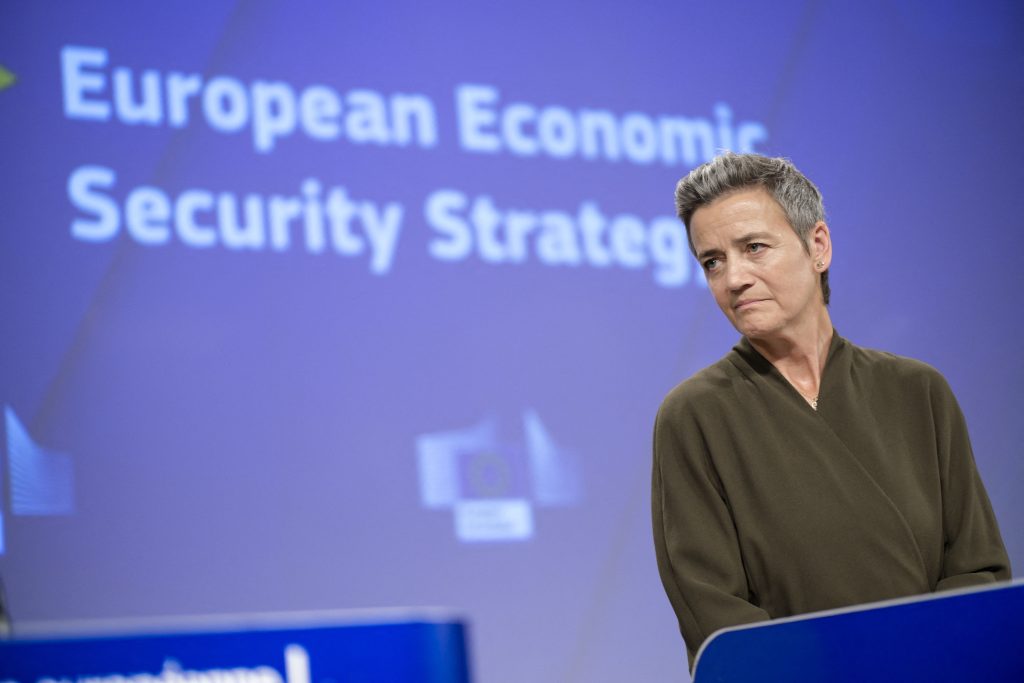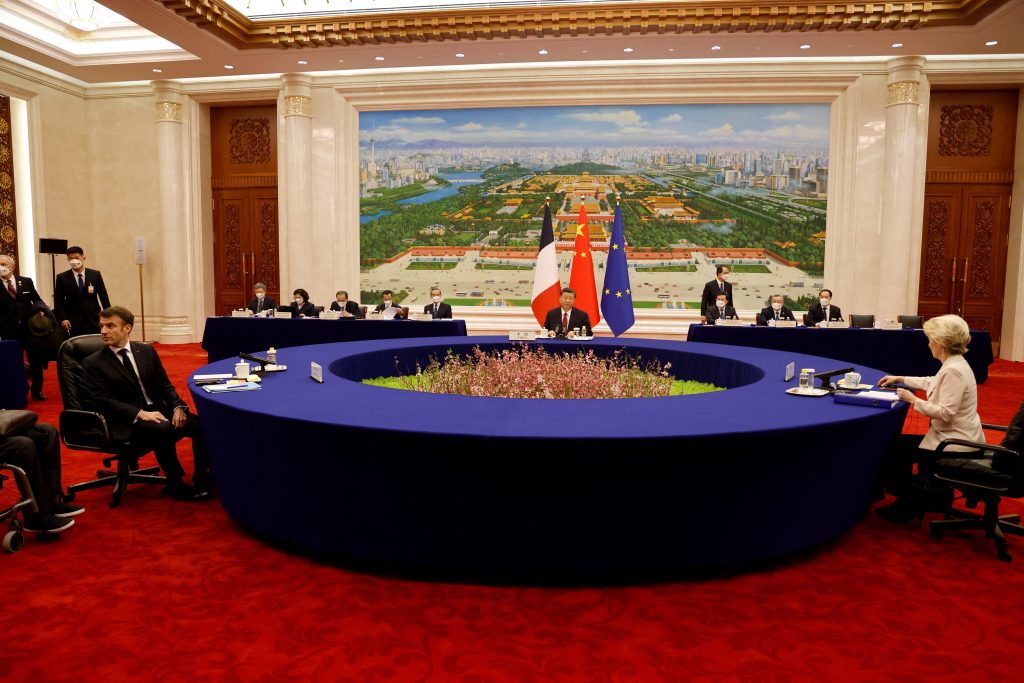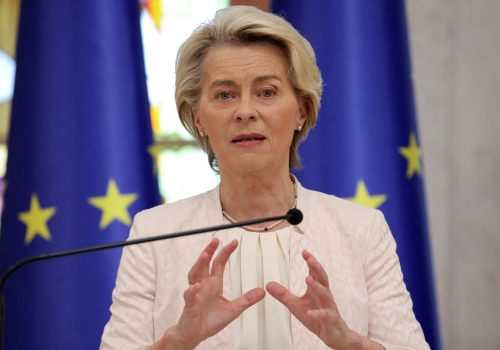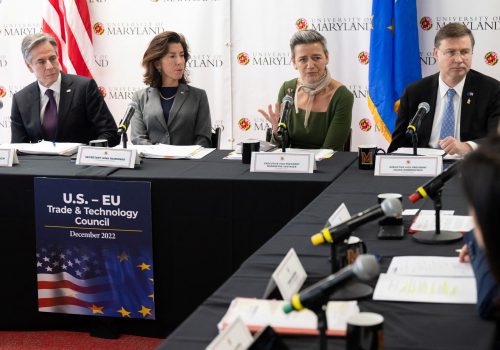Don’t call it decoupling. This week, the European Commission released its European economic security strategy, an ambitious plan to intercede in the European economy to reduce security risks across supply chains, critical infrastructure, and digital technology. European Commission Executive Vice-President Margrethe Vestager underscored that the strategy will “de-risk” the European Union (EU) from threats, not “decouple” its economy. But from whom? While the strategy dodges a direct answer, the EU’s top trading partner in goods, China, is an understood top concern.
Read insights below from Atlantic Council experts on what’s in the strategy and what it reveals about Europe’s economic and geopolitical future.
Click to jump to an expert analysis:
Jörn Fleck and James Batchik: Europe is taking a hard look at itself
Barbara C. Matthews: The EU is acting to decrease points of vulnerability for renewable energy
Charles Lichfield: While not mentioned, China is the central focus of the strategy
Sarah Bauerle Danzman: The road to an EU outbound investment mechanism will be rocky
Elmar Hellendoorn: The strategy seeks to be adaptable but also comprehensive
Europe is taking a hard look at itself
The European economic security strategy represents a welcome development not just for its contents but in how the European Commission is thinking about economic security—and itself.
Under a framework of “promote, protect, and partner,” the strategy sheds light on the commission’s approach to de-risking, the phrase du jour of today’s geopolitics. It proposes new assessments of vulnerabilities, strengthened rules on key areas like foreign direct investment and export controls, and new rules on outbound investment. It also recycles existing proposals—the Critical Raw Materials Act, Net-Zero Industry Act, and Cyber Resilience Act, for example. By themselves, these are not groundbreaking. But it would be a mistake to stop there. Taken together, the strategy is a welcome document that outlines how the commission sees its policies become larger than the sum of their parts.
The contents of the strategy notwithstanding, there are three takeaways about how Europe sees its economic future. First, it starts with knowing oneself. The strategy opens with a frank acknowledgement that Europe was “insufficiently prepared” for many of the challenges that the COVID-19 pandemic, Russia’s war in Ukraine, and challenges from unnamed—read: China—players posed to Europe. Second, the strategy acknowledges that the European market, its regulations, and cohesion is by itself a European strength that can “keep global supply chains open and shape standards.” Third, that there is a direct reference that the economic risks identified could threaten Europe’s national security is a small but notable addition. It shows a recognition of the convergence of the geopolitical and the economic.
However, the strategy also shows both the potential and the limitations of the commission. First, as much as the Berlaymont may be thinking geopolitically, the commission still relies on capitals across the continent to approve and implement new rules. Throughout the strategy, there are polite reminders for member states to implement or enforce existing or future rules. Second, and perhaps more crucially, it’s clear that the commission is increasingly out ahead of member states on issues of security, defense, and now economics. Many member states will have reservations, if not objections to some of the conclusions and proposals in the strategy. There is no shared consensus among member states about how to adequately defend themselves against China.
It’s important to remember that, as the strategy’s sentences, conjunctions, and punctuation will now be parsed and debated across the continent and the European Parliament, the strategy is not a roadmap that will solve all of Europe’s woes but an opening salvo.
—Jörn Fleck is the senior director of the Europe Center at the Atlantic Council.
—James Batchik is an assistant director at the Atlantic Council’s Europe Center.
The EU is acting to decrease points of vulnerability for renewable energy
The newly announced European economic security strategy constitutes a shift beyond the EU’s previous “strategic autonomy” security priorities. It will likely generate friction with both China and the United States in the near term regarding key renewable energy resources.
Until this year, the EU’s main focus was to ensure that its capacity to pursue its strategic interests remain unconstrained. It sought to ensure that policy conflicts and tensions between the United States and other countries (such as China and Russia) did not adversely impact its own interests.
Now, the EU seeks actively to minimize “the risks arising from economic linkages that in past decades we viewed as benign.” Those past linkages include Russia (natural gas), China (automobile component and other industrial manufactured exports) and the United States (a deeply integrated, multidimensional trade relationship that includes a deep reliance on retail technology giants that dominate the twenty-first century). Following Russia’s illegal invasion of Ukraine in 2022, the EU effectively replaced Russia with the United States as the key external supplier of energy resources, even as it made great strides toward delivering an energy mix that, for the first time, is generated more from renewable sources (specifically, wind and solar) than from gas.
The new EU “de-risking” strategy now views none of these economic linkages as benign. It views concentrated economic relationships as a source of risk that must be managed through a diversification strategy that places alignment on key norms (such as democracy, decarbonization, and commitment to open economies) as the foundation for future engagement.
Europe’s successful shift in the last year toward renewable energy implies a sharp increase in demand by Europe for a range of energy inputs that are, at present, predominantly controlled by China. Not only does China “dominate all steps of solar panel production,” it also has long served as the “dominant or near-monopoly producer” of most critical minerals needed to produce modern technology and renewable energy components such as wind turbine parts. Europe’s demand for hydrogen and lithium are set to skyrocket in the next decade, increasing the importance of the forthcoming Critical Minerals Agreement negotiations with the United States. The EU is acting now to decrease these points of vulnerability by mobilizing significant financial resources to promote renewables developments across Africa, the Middle East, and Latin America, even as it prepares to implement its carbon tax later this year.
The European policy shift to “de-risking” holds the promise of aligned transatlantic policy priorities in which EU and US initiatives complement each other to provide an effective counterbalance to Chinese economic pressure globally across the resource-rich Global South. It also holds the risk that misalignment with the United States regarding resource access and digital policy will generate frictions that can be exploited by other countries. Successful execution of this policy will require more than checkbook diplomacy. It will require Washington and Brussels to focus on the larger strategic picture to avoid individual technical issues from derailing their strategic relationship.
—Barbara C. Matthews is a nonresident senior fellow at the Atlantic Council. She was the first US Treasury attaché to the EU with the Senate-confirmed diplomatic rank of minister-counselor.
While not mentioned, China is the central focus of the strategy
The seventeen-page long “communication” on a European economic security strategy does not mention China once. It does refer to Russia, but only in its scene-setting introduction. For the rest of the paper, economic risks stem only from phenomena, not countries. Third countries are the focus of the section following these risks, but this puts them in an exclusively positive light: to confront challenges to its economic security, Europe needs the broadest possible partnerships.
Can there be any purpose to a strategy that dares not mention which countries are causing the risks it is supposed to tackle? The answer is still yes.
The robust discussions that took place between European Commission President Ursula von der Leyen’s team and the European Council—representing the views of all twenty-seven member states—are well publicized. A critical mass of national capitals, though concerned about the consequences of Chinese economic practices, are keen to avoid falling into a ratchet of policies and partnerships leading to an anti-China coalition. This includes members who have long been calling for the EU to take a more hands-on approach on economic statecraft, such as France.
And yet, even under such constraints, the strategy gets many things right. Alongside the traditional calls for cooperation, it pushes for more structured dialogue with the private sector—something that has been lacking on economic security strategy so far. We should also remember that von der Leyen did get to set out her views on EU-China relations not too long ago. So even if China isn’t mentioned, we can be pretty sure it remains the central focus of the EU’s fledgling strategy.
—Charles Lichfield is the deputy director and C. Boyden Gray senior fellow, of the Atlantic Council’s GeoEconomics Center.
The road to an EU outbound investment mechanism will be rocky
This strategy makes clear that the commission is going to bat for outbound investment controls, likely tightly connected to the three emerging technologies most poised to transform war making capabilities—advanced semiconductors, quantum computing, and artificial intelligence. This position reflects a rapid evolution in the commission’s thinking; just last year it was less enthusiastic toward outbound controls when the United States first announced its intention to develop a tool to regulate such investments. Then it only agreed to “study the issue.” Despite the commission’s commitment to propose an outbound initiative by the end of 2023, the debate between the EU, member states, and the business community is likely to be fierce.
In the near term, the inclusion of outbound investment in the strategy has two important implications. First, it substantially increases the likelihood that the United States will move forward with its own mechanism—through an executive order—in the next couple of months. The Biden administration can now point to the document as evidence of a growing consensus among partners and allies to place narrow restrictions on outbound investments into key strategic technologies. Second, and in line with the recent Group of Seven (G7) communiqué on economic resiliency, it frames the issue of outbound regulation squarely around technology security and technology leakage rather than around broader policy objectives such as supply-chain diversification.
The road to an EU outbound investment mechanism will be rocky. The economic security strategy identifies technology security as an element of “economic security,” but the proliferation of dual-use technology has traditionally been viewed as a matter of national security—an area over which member states, rather than the commission, have competence. Moreover, the EU has traditionally—through both export control and inward screening policies—sought to develop tools that do not discriminate between foreign countries. If the EU maintains this policy principle, its outbound mechanism will likely look quite different from the United States’ plan to only focus on investments into entities operating in or owned by “countries of concern” such as China.
—Sarah Bauerle Danzman is a nonresident senior fellow with the GeoEconomics Center’s Economic Statecraft Initiative and associate professor of international studies at the Hamilton Lugar School for Global and International Studies, Indiana University Bloomington.
The strategy seeks to be adaptable but also comprehensive
The most important element of the document can be read between the lines: it is not so much about what the commission is going to do about economic security but how. Three key principles seem to be guiding the commission’s economic security strategy.
The first principle is strategic adaptability. The commission announces that it will constantly work toward a vision on economic security that will help to tie the different policy instruments together. As geopolitical circumstances are changing in unforeseeable and complex ways, the commission has wisely refrained from setting its economic security policy approach in stone. Adaptability and flexibility appear to be baked into the commission’s thinking on this issue.
The second principle is comprehensiveness. In the strategy, the commission clearly expresses the ambition to break through different policy silos. While it does sum up the different policy instruments the EU has to strengthen its economic security—ranging from foreign direct investment screening to cybersecurity—the underlying question is how it is going to coordinate the use of its economic statecraft toolkit to achieve a maximum result.
The third principle is cooperation. The commission also shows a certain humility in pointing out all the work ahead on economic security. Clearly, it needs the support of its member states, not only in terms of policy execution, but also in helping to fully understand the challenge. Also, the EU is going to align its diplomacy and economic security policy more, thus targeting countries that the EU can work with to achieve greater economic security. Lastly, in terms of further conceptualization of its strategic approach to economic security, the commission also seems to be reaching out to the wider private sector.
—Elmar Hellendoorn is a nonresident senior fellow with the Atlantic Council’s GeoEconomics Center.
Further reading
Fri, Jun 16, 2023
What the EU’s economic security strategy needs to achieve
Econographics By Elmar Hellendoorn
The Commission must balance members' economic relations with China and simultaneously coax them toward a more “realpolitik” view of the world. None of that will be easy.
Thu, Jun 15, 2023
The world’s regulatory superpower is taking on a regulatory nightmare: artificial intelligence
New Atlanticist By
Atlantic Council experts answer the most pressing questions on the EU's AI Act, including what's in it, when it could become law, and what it means for the world.
Thu, Apr 20, 2023
The US-EU Trade and Technology Council: Assessing the record on data and technology issues
Issue Brief By
The TTC must keep its forward-looking gaze, but also take steps to address challenging regulatory issues, either by oversight or direct discussion, or it will lose the essential support among stakeholders that can keep US engagement in the TTC alive.
Image: EU Commission Executive Vice-President Margrethe Vestager holding a joint press conference on the European Economic Security Strategy in Brussels, Belgium on June 20, 2023.




